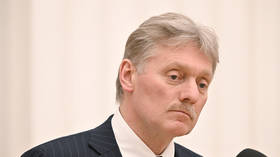‘Fake news’ about Russian state bodies abroad criminalized

Russia’s State Duma, the parliament’s Lower House, has adopted new legislation which could see those “disseminating false information” about state institutions abroad jailed for up to 15 years. The move follows similar legislation targeting individuals deemed to be spreading “fake news” about the actions of the country's military forces.
On Monday, commenting on the legislation, Kremlin spokesperson Dmitry Peskov told reporters that “unprecedented conditions require unprecedented solutions.” He explained that the current situation can be described as unprecedented "in terms of imposing absolute hatred on everything Russian, whether it is Russian missions, Russian citizens, or foreign citizens [who] are of Russian origin."
“Everyone now faces just hatred, oppression and situations that sometimes begin to pose a threat to health and life,” he added.
On Tuesday, parliamentarians approved the amendments to the Criminal Code and to the Code of Administrative Offenses, both in the second and in the third reading.
Once the legislation comes into force, “public dissemination of knowingly false information under the guise of reliable messages” about work of state Russian agencies abroad might be penalized with a fine of 700,000 - 1.5 million rubles (approximately $6,700 – 14,500) or imprisonment for up to three years.The same act committed by somebody who uses an official position, or by a group of people, “with the artificial creation of evidence for the accusation,” “with mercenary motives”, or “based on political, ideological, racial, national or religious hatred or enmity,” could be punished with a fine of 3 - 5 million rubles (appr. $28,800 – 48,400) or imprisonment for 5-10 years.
“If the mentioned acts caused grave consequences, they will be punished by imprisonment for a term of 10 to 15 years,” the Duma announced.
In addition to the “dissemination of knowingly false information,” criminal liability will also apply to “public actions aimed at discrediting” the work of Russian entities abroad.
According to the legislation’s author, the chair of the Duma’s information policy committee, Alexander Khinstein, Russian diplomats and the employees of Rossotrudnichestvo (Federal Agency for the Commonwealth of Independent States Affairs, Compatriots Living Abroad, and International Humanitarian Cooperation) “are now operating practically in combat conditions.”
Earlier this month, Russian lawmakers approved legislation banning the dissemination of ‘fake news’ about Moscow’s military operations in Ukraine. Those found guilty under the law are liable to be placed behind bars for up to 15 years. The media regulator Roskomnadzor also blocked access to several foreign media outlets as well as domestic concerns such as Ekho Moskvy radio and the Dozhd TV channel.
Ukraine’s government, meanwhile, on March 19 outlawed 11 political parties, including the parliament’s second-largest group, Opposition Platform – For Life, for its alleged “connections” with Russia. On the same day the country’s President Volodymyr Zelensky signed a law introducing a “unified information policy” that provides for the merger of all national news TV channels into a single “round-the-clock information marathon.”
Moscow and Kiev have consistently blamed each other for spreading disinformation amid the ongoing military action.
Russia attacked Ukraine in late February, following a seven-year standoff over Kiev’s failure to implement the terms of the Minsk agreements and Russia’s recognition of the Donbass republics with capitals in Donetsk and Lugansk. The German- and French-brokered protocols had been designed to regularize the status of those regions within the Ukrainian state.
Russia has demanded that Ukraine officially declare itself a neutral country that will never join the US-led NATO military bloc. Kiev insists the Russian offensive was completely unprovoked, denying claims it was planning to retake the Donbass republics by force.















